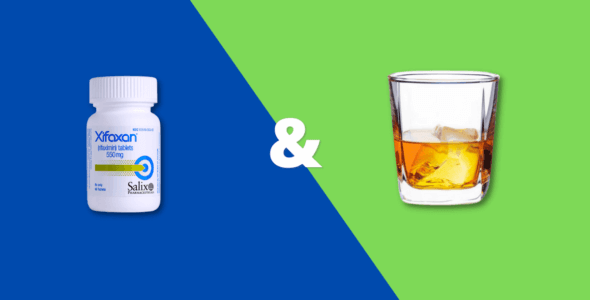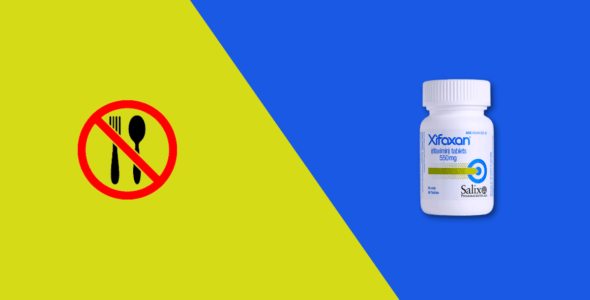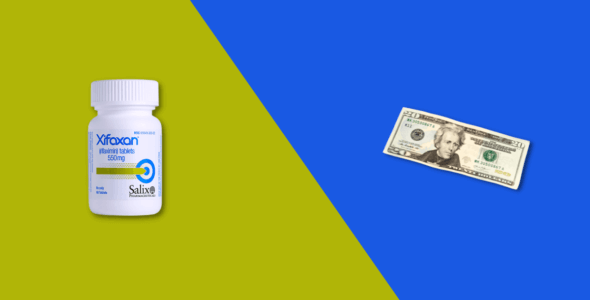Xifaxan Dosage, forms & strengths
Complete a free online enrollment application to find out if you’re eligible to pay only $49 per month for your Xifaxan medication.
Get started todayXifaxan (rifaximin) is a prescription rifamycin antimicrobial medication that is manufactured by Salix Pharmaceuticals. It is FDA-approved for the:
- Treatment of traveler’s diarrhea caused by noninvasive strains of escherichia coli (E.coli) in patients 12 years of age and older.
- Treatment of irritable bowel syndrome with diarrhea (IBS-D) in adults.
- Prevention of hepatic encephalopathy in adults with liver disease.
How does Xifaxan work?
Rifaximin is a synthetic broad spectrum antibacterial that is structurally similar to rifampin. Xifaxan is poorly absorbed into your bloodstream when it passes through your gastrointestinal tract so it would not be effective for infections in other parts of your body. It treats infections in your stomach and intestines by blocking the bacteria’s ability to make proteins they need to live.
Xifaxan dosage forms and strengths
- 200 mg tablet
- 550 mg tablet
Xifaxan dosage
The dose and how long you take Xifaxan will depend on the condition being treated:
- Traveler’s diarrhea: 200mg by mouth 3 times daily with or without food for 3 days.
- Hepatic encephalopathy: 550mg by mouth twice a day with or without food.
- IBS-D: 550mg by mouth 3 times daily with or without food for 14 days. You can be retreated at this same dosage 2 times if needed.
Xifaxan dosage restrictions
The use of Xifaxan in patients with kidney (renal) impairment has not been studied. While hepatic (liver) impairment causes a significant increase in Xifaxan concentrations, no dosage adjustment is recommended as it is poorly absorbed into the bloodstream. Patients with severe hepatic impairment should be monitored for increased systemic exposure and adverse effects.
How to take Xifaxan
- Read the Full Prescribing Information with drug information and Medication Guide that comes with this medication.
- Use Xifaxan exactly as your healthcare provider prescribes it. Do not change your dose without discussing it with them.
- Xifaxan is taken 2 or 3 times a day with or without food, depending on the medical condition being treated. You shouldn’t stop taking Xifaxan, even if you start to feel better. If you do not finish the full course of Xifaxan, your symptoms may return or it may lead to bacterial resistance.
- If your symptoms of traveler’s diarrhea worsen or do not improve in the first 48 hours of starting Xifaxan, call your doctor.
- Store Xifaxan at room temperature between 59°F and 77°F (15°C and 25°C) away from light and moisture.
Xifaxan dosage FAQs
What are the most common side effects of Xifaxan?
The most common side effects of Xifaxan in clinical trials include:
- Nausea
- Flatulence (gas)
- Abdominal pain
- Fatigue
- Dizziness
- Peripheral edema (swelling in your hands and feet)
- Headache
- Constipation
- Fever
- Vomiting
Xifaxan can sometimes cause more serious side effects, including:
- Serious hypersensitivity reactions (hives, angioedema, and shortness of breath)
- Ascites (fluid buildup in and around your stomach)
- Clostridium difficile (C. difficile) associated diarrhea and colitis
Contact your healthcare professional for medical advice about any adverse effects you experience while taking Xifaxan. You can report your adverse reactions to the FDA at 1-800-FDA-1088 or www.fda.gov/medwatch.
What drug interactions occur with Xifaxan?
The concomitant use of Xifaxan with other medications may change the way they work or increase the frequency and severity of side effects. Discuss with your doctor whether any of the prescription drugs, over-the-counter medications, vitamins, and herbal supplements you take may interact with this medication, including:
- P-gp inhibitors such as cyclosporine
- Warfarin
Are there any contraindications or precautions with Xifaxan?
Xifaxan should not be taken if you have the following conditions:
- Known hypersensitivity reaction to rifaximin, rifamycin antibiotics, or the inactive ingredients in this product
- Diarrhea with fever, blood in your stool, or diarrhea from a pathogen other than E. coli
Xifaxan should be used with caution in the following medical conditions:
- Liver impairment
- Pregnant or plan to become pregnant
- Breastfeeding or plan to breastfeed
Can you take Xifaxan while you are pregnant or breastfeeding?
There aren’t any randomized, well-controlled studies on the use of Xifaxan in pregnant women. Animal studies have showed it can cause harm to the fetus. There is no data on whether Xifaxan is found in breast milk during lactation or the effects it may have on the infant. You should always discuss the risks and benefits of any medication with your healthcare provider if you are pregnant, plan on becoming pregnant, or are breastfeeding.
What if I miss a dose of Xifaxan?
If you miss a dose, take it immediately. If it is almost time for your next dose, skip the missed dose and take it at your regularly scheduled time. Do not take extra doses to make up for a missed dose or take more than is prescribed for you.
Does Xifaxan cause weight gain?
No, Xifaxan does not typically cause you to gain weight. If you notice a rapid weight gain or other symptoms such as a build up of fluid around your stomach, stomach pain, or difficulty breathing while lying down, notify your doctor immediately. It could be the sign of a serious complication of Xifaxan called ascites.
How long does it take for Xifaxan to work for SIBO?
Xifaxan is an antibiotic therapy that is used off-label in the treatment of small intestinal bacterial overgrowth (SIBO). Doses of 1600mg/day of Xifaxan for 7 days have been effective in reducing bacteria in the intestines which should lead to relief of symptoms such as stomach pain, diarrhea, and bloating.
Related resources for Xifaxan dosage:
- https://www.xifaxan.com/hcp/
- https://shared.salix.com/globalassets/pi/xifaxan550-pi.pdf
- https://www.drugs.com/xifaxan.html
- https://reference.medscape.com/drug/xifaxan-rifaximin-342685
- https://www.pdr.net/drug-summary/Xifaxan-rifaximin-502
- https://medlineplus.gov/druginfo/meds/a604027.html
- https://www.ncbi.nlm.nih.gov/books/NBK562329/
- https://www.ncbi.nlm.nih.gov/books/NBK546634/


